MercoPress. South Atlantic News Agency
Tag: British Antarctic Survey (BAS)
-
Monday, February 5th 2024 - 10:51 UTC
BAS autonomous drone, Windracers ULTRA, to survey Antarctica at lower cost and lower carbon footprint
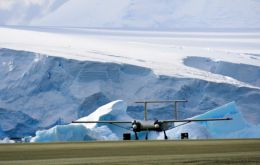
A team have arrived at Rothera Research Station, ready to start testing the new Windracers ULTRA autonomous drone in Antarctica. If successful, the new drone platform could represent a major addition to British Antarctic Survey’s scientific capability on the frozen continent – offering the potential to do more science at a lower cost, with a lower carbon footprint than traditional crewed aviation.
-
Tuesday, January 30th 2024 - 10:50 UTC
Effects on climate change by disturbing the seabed, BAS and Norway scientists
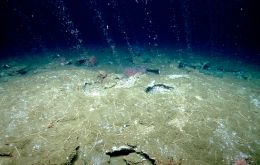
A study published this month in the journal Frontiers in Marine Science reveals that disturbing the seabed, through activities such as trawling, could increase the scale and speed of climate change.
-
Thursday, January 25th 2024 - 15:03 UTC
Scientists on board RRS Sir David Attenborough set to unlock Southern Ocean’s carbon secrets

A team of scientists are embarking on an ambitious 30-day scientific expedition on board Falkland Islands flagged RRS Sir David Attenborough to investigate how carbon dioxide moves and transforms in the Southern Ocean. The ship heads to the Weddell Sea to begin the PICCOLO cruise this week, from Punta Arenas, Chile.
-
Tuesday, January 23rd 2024 - 11:05 UTC
BAS scientists carry out aerial survey of sub-Antarctic largest penguin colony
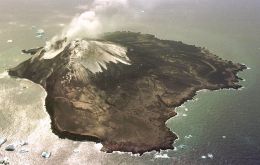
Researchers from British Antarctic Survey (BAS) have carried out aerial surveys of the remote volcanic Zavodovski Island in the sub-Antarctic to count the largest penguin colony in the world.
-
Thursday, January 11th 2024 - 17:13 UTC
BAS staff awarded Polar Medal in 2024 New Year's Honors List

British Antarctic Survey (BAS) have been awarded a Polar Medal in the 2024 New Year’s Honors List for their contributions to improving our understanding of Antarctica and enduring harsh Antarctic conditions.
-
Wednesday, November 29th 2023 - 14:12 UTC
Using a new AI tool to track the life cycle of icebergs in Antarctica
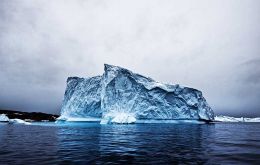
Researchers are using a new AI tool to detect icebergs in the Southern Ocean. This is the first step towards scientists being able to track the complete life cycle of most icebergs across Antarctica from satellite data. The study published in the journal Remote Sensing of the Environment points out a report from the British Antarctic Survey.
-
Saturday, October 21st 2023 - 10:50 UTC
BAS begins its ambitious 2023/24 Antarctic field season: 60 projects and 600 people

The British Antarctic Survey has announced that the 2023/24 Antarctic field season has started, with over 600 people beginning the journey South to work on over 60 projects on station and in the field. The season of work speaks clearly to the new 10-year science strategy, Polar Science for a Sustainable Planet, making the most of our operational capabilities across BAS five Antarctic stations, aircraft, and research ship.
-
Wednesday, September 20th 2023 - 08:13 UTC
Brunt Ice Shelf moving faster after calving of giant iceberg

Following the calving of the A-81 iceberg at the end of January 2023, the Brunt Ice Shelf is moving faster than before. It is currently moving approximately 4 meters a day towards the sea, whereas before the calving it moved at an average of between 1-2.5 meters a day.
-
Wednesday, August 30th 2023 - 08:41 UTC
Loss of sea ice causes catastrophic breeding failure for emperor penguins
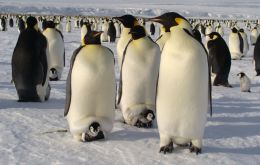
Emperor penguin colonies experienced unprecedented breeding failure in a region of Antarctica where there was total sea ice loss in 2022. The discovery supports predictions that over 90% of emperor penguin colonies will be quasi-extinct by the end of the century, based on current global warming trends.
-
Sunday, August 27th 2023 - 14:48 UTC
Emperor penguins in danger due to sea ice melting
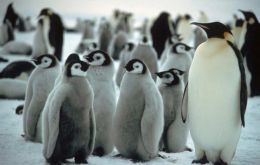
According to a peer-reviewed British Antarctic Survey report released late last week, the melting of sea ice might have caused the death of some 10,000 Emperor penguin chicks by the end of 2022.
